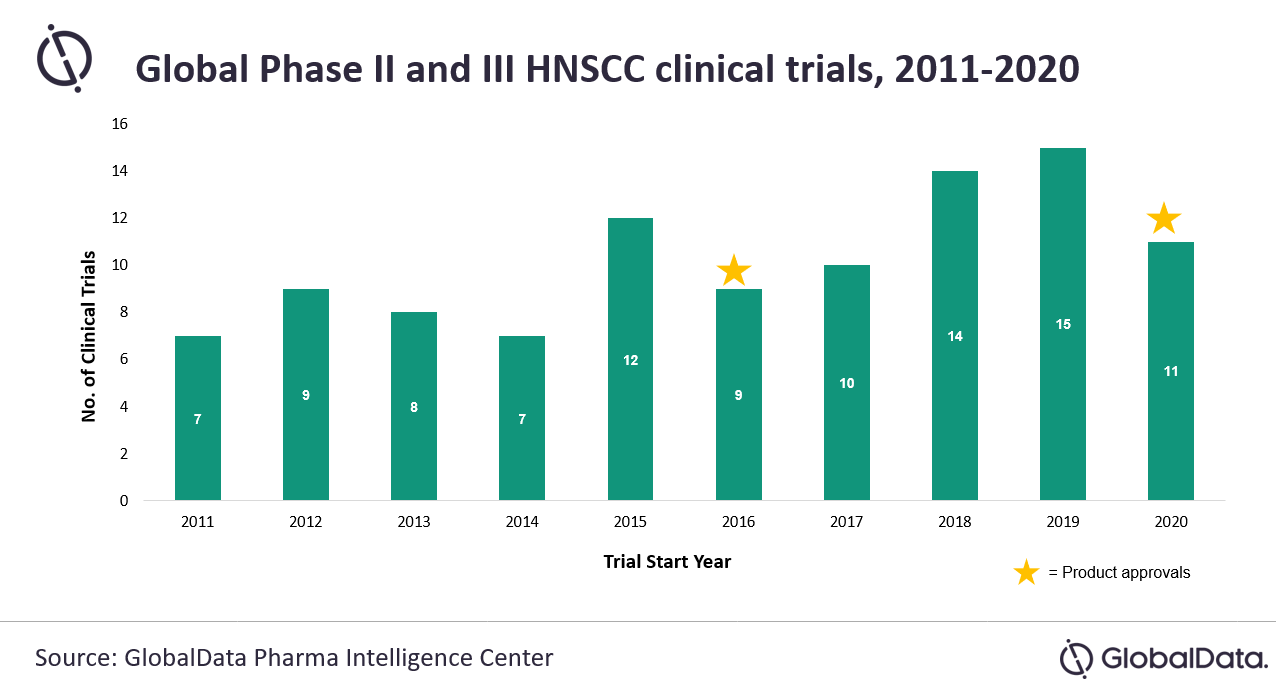09 Mar, 2021 Recent trial failures highlight challenges in clinical development for head and neck cancer, says GlobalData
Posted in PharmaAstraZeneca/Medimmune Therapeutics’ Imfinzi (durvalumab), an immunotherapy targeting programmed death-ligand 1 (PD-L1), recently failed to demonstrate increased overall survival (OS) in patients with recurrent or metastatic head and neck squamous cell carcinoma (HNSCC) in its Phase III KESTREL clinical trial (NCT02551159). This recent failure highlights the challenges in trial completions and development of novel entities in the HNSCC space and further accentuates the impact such failures have on pharmaceutical companies’ clinical development strategies, according to GlobalData, a leading data and analytics company.
Aarohi Rede, BDS, MPH, Oncology Analyst at GlobalData, comments: “Over the last few years, there have been several setbacks in late-stage HNSCC. The results of the Phase III JAVELIN study (NCT02952586), which were released in mid-2020, showed that EMD Serono/Pfizer’s Bavencio (avelumab) missed its primary endpoint for a locally-advanced HNSCC population. This followed the failure of Merck & Co’s Keytruda (pembrolizumab) in earlier phase trials in the first-line recurrent/metastatic HNSCC setting in 2017.”
Additionally, despite achieving its primary endpoint of progression-free survival in a clinical study, Boehringer Ingelheim’s Gilotrif (afatinib), which is indicated for use in NSCLC, did not receive marketing approvals in HNSCC, primarily due to a lack of clinically meaningful data in comparison to other established therapies and concerns over product safety.
According to GlobalData, of the total 102 Phase II and III clinical trials conducted globally between 2011-2021 and the total product approvals in HNSCC that were initiated during that period, only two trials achieved their primary endpoints resulting in marketing approvals.

Rede continues: “HNSCC is largely a chemotherapy-dominated market, but the past few years have seen effective use of Keytruda and Bristol-Myers Squibb’s Opdivo (nivolumab) in the recurrent or metastatic settings. The current clinical development pipeline has around 20 late-stage agents in the immuno-modulating therapy or small molecule inhibitor classes. Their clinical adoption depends on their ability to demonstrate an improved survival benefit. As such, immunotherapy holds promise in this indication as discussed with key opinion leaders in this field.
“Nearly 750,000 patients were diagnosed with head and neck cancer globally in 2020, according to the World Health Organization and the GLOBOCAN 2020 database. As such, the failure of late-stage drugs in clinical development for HNSCC poses further challenges to advances in treatment. While the late-stage HNSCC pipeline holds promise, it still remains to be seen whether or not this market will see further introductions of immunotherapies or other classes of targeted therapies, as evidenced in other solid tumors.”
*8MM = US, France, Germany, Italy, Spain, the UK, Japan, and Urban China
5EU = France, Germany, Italy, Spain, the UK
ASPAC = Japan, Urban China
